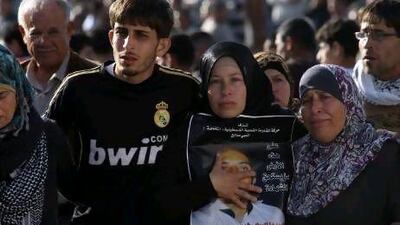RAMALLAH // Anger in the West Bank has been directed not only at Israel in response to the military attacks on Hamas-controlled Gaza, but also towards the West Bank's governing Palestinian Authority.
Many here think it has done too little during this latest bombardment.
"The Palestinian Authority is not doing what it should do for Gaza," said Fakhri Barghouti, who was released in October after serving 33 years in an Israeli prison.
"This time, people are not waiting for the Palestinian Authority. The Palestinian people are doing the government's job.
"People must go to the streets to pressure Arab governments and the world's governments to do something."
Mr Barghouti's large, prominent family clan have been traditionally affiliated with the Fatah movement that dominates the West Bank government, and which has been involved in an often bitter, sometimes violent, rivalry with Hamas.
The western-backed Fatah movement lost control of the Gaza strip to Hamas five years ago.
Although the two Palestinian factions announced this week that they were "ending the division" in response to the Israeli attacks, Hamas has in recent days gained a slight upper hand as it strengthens its relationships with some post-Arab Spring governments.
Egyptian and Tunisian officials have visited the Gaza Strip to show their support.
This "could increase the ability of Hamas to behave and move as an independent authority", said Samir Awad, a professor of political science at Birzeit University near Ramallah.
"Now, we are seeing [foreign] ministers going to Gaza, not to the West Bank," he added.
As Hamas forges new relationships, the Palestinian Authority president, Mahmoud Abbas, who is also a founding member of Fatah, faces mounting challenges in the West Bank.
Despite his push for Palestinian statehood at the United Nations, fewer than half of the Palestinians polled by the Palestinian Center for Policy and Survey Research in September said they were satisfied with his performance.
As the death toll has risen in Gaza, Mr Abbas has remained at his headquarters in Ramallah.
"Yes, to armed resistance" was scrawled on the outer wall this week, but quickly painted over.
Mr Abbas has repeated that there will be no armed uprising under his watch.
But there have been protests across the West Bank in recent days, during which at least one demonstrator was killed in clashes with the Israeli military.
Armed with rocks and slingshots, young Palestinians have confronted the Israeli forces.
The protests have been relatively small and confined only to certain areas. In part, this is because of the on-going security cooperation between the Palestinian Authority forces and Israeli military in the West Bank.
"Palestinians don't want to see Israeli security officers cooperating with Palestinian officers while Israel is killing civilians in Gaza," said Mr Awad.
This cooperation between the security forces was included in the two-decade-old Oslo Accords.
Nour Odeh, a spokeswoman for the Palestinian Authority, said the cooperation had benefited the Palestinians and has been the key to allowing the movement of goods and people in the West Bank.
"It's also for protecting their lives," she said, in reference to several incidents in which Palestinian security forces had prevented protests from reaching Israeli military installations.
In response to criticism about the Palestinian Authority's tepid reaction to the Gaza crisis, Ms Odeh stressed that it had sent medical and other supplies to Gaza and had been influential in pursuing a diplomatic solution.
However, these efforts seem to have failed to satisfy some Palestinians.
"Mahmoud Abbas doesn't represent me and doesn't represent most of the Palestinian people," said a protester on Monday while trying to catch his breath after clashing with Israeli soldiers outside of Ofer military prison.
"He's reacting to the cause of Gaza like he's living in Paris or Switzerland - like any other foreign minister or president," said the protester who declined to give his name.
"He did not react like it's his home, his people.'

